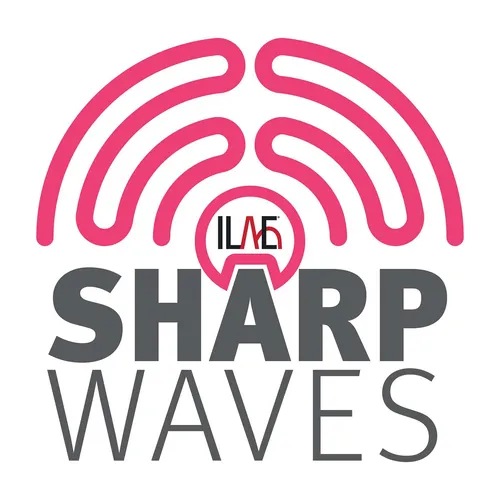
Sharp Waves: ILAE's epilepsy podcast
Epilepsy affects more than 50 million people. Every day. Sharp Waves brings you stories about people with epilepsy, physicians treating epilepsy, and researchers studying the condition. We'll cover the latest research, challenges to diagnosis and treatment, and issues from around the world.
- Update frequency
- every 13 days
- Average duration
- 25 minutes
- Episodes
- 89
- Years Active
- 2021 - 2025

"Talking about things that no one else will talk about": Torie Robinson, host of Epilepsy Sparks Insights
For her podcast, Epilepsy Sparks Insights, Torie Robinson interviews epilepsy clinicians and scientists from around the world. Diagnosed with epilepsy at age 10, Torie is wo…

Neurology researcher and parent advocate: Dr. Luis Oliviera and the v-ATPase Alliance
Dr. Luis Oliviera is parent to a son with an ultra-rare developmental and epileptic encephalopathy. He's also a researcher with the Michael J. Fox Foundation. He created a…

The Idea of Epilepsy: Dr. Phillip Pearl and Dr. Simon Shorvon
The Idea of Epilepsy, published in 2023, covers the history of epilepsy from multiple perspectives over the past 160 years. It ends with a tantalizing question: Does epileps…

First seizure from sleep - What is the risk of recurrence? Dr. Elaine Pang
Are people who have their first seizure during sleep at greater or lesser risk for future seizures, compared with people who have their first seizure when they're awake? Dr.…

Cannabinoids, endocannabinoids, and epilepsy: Dr. Raphael Mechoulam
Dr. Raphael Mechoulam was an organic chemist at the Hebrew University of Jerusalem, and the father of cannabis research. His team was the first to elucidate the structure of…

Autism and epilepsy: Dr. Colin Reilly and Dr. Stéphane Auvin
Nearly one-third of people with autism also have epilepsy. Researchers aren't sure why.
For people on the spectrum, epilepsy can prompt unique challenges. Seizure symptoms …

Dravet syndrome and the influence of the genome: Dr. Sanjay Sisodiya
Dravet syndrome is a rare, severe epilepsy caused by changes in a gene called SCN1A. The changes cause the gene to stop functioning normally. But not everyone with this type…

Attorney turned author pens an epilepsy-focused novel: Sara Staggs
Sara Staggs was a civil rights attorney and pregnant with her second child when her doctors told her to stop practicing law: her seizures had become too frequent. Staggs' 20…

Cerebral amyloid angiopathy, seizures, and epilepsy: Dr. Brin Freund
We'll frame today's talk around a paper recently published in the European Journal of Neurology: "The incidence and risk factors associated with seizures in cerebral amyloi…

Research recap: Modified Atkins diet and health-related quality of life - Dr. Magnhild Kverneland
Diet treatments are often used with the aim of reducing seizure frequency and severity — but they may have other benefits as well.
Findings from a recent study conducted in …

Statins and epilepsy: Dr. Emilio Russo & Dr. Tony Marson
Some published data suggest that besides their effect on cholesterol, statins also may play a neuroprotective role in some neurological disorders, including epilepsy. Dr. Br…

Caring for someone with functional seizures: Shannon Guinard's story
Functional seizures, also known as psychogenic nonepileptic seizures (PNES), resemble epileptic seizures. Unlike epilepsy, they are not prompted by any electrical activity i…

Circadian rhythms and epilepsy Part II: Dr. Maxime Baud
Do seizures have daily, weekly, monthly, or other rhythms? In Part 2 of our two-part series on circadian rhythms, Dr. Laurent Sheybani talks with Dr. Maxime Baud about the l…

Circadian rhythms and epilepsy Part I: Dr. Mark Quigg
The cyclic properties of seizures have been known for more than 100 years, but does everyone with epilepsy have a seizure pattern? What can be learned from seizure diaries,…

An update on SUDEP and SUDEP counseling: Dr. Suvasini Sharma
Sudden Unexpected Death in Epilepsy (SUDEP) affects about one out of every 1.000 people with epilepsy. Despite its rarity, SUDEP is important to discuss, but some physician…

Artificial intelligence and epilepsy: Dr. Christian Bosselmann
Discussions of artificial intelligence and ChatGPT are everywhere. How will this technology affect epilepsy research and care? What are the dangers and pitfalls, and what do…

Neurocysticercosis and epileptogenesis: Dr. Hector Garcia
Neurocysticercosis - an infection of the brain by a pork tapeworm (Taenia solium) – is one of the most common causes of seizures worldwide. People with neurocysticercosis ha…

How and why to address medication adherence: Dr. Avani Modi and Dr. Desiree Williford
Most people with epilepsy have difficulty always taking their medications as prescribed. How can clinicians and patients talk about the issue and find solutions? Sharp Waves…

Africa's plans for improving epilepsy care: Action Amos
ILAE spoke with Action Amos, from the International Bureau for Epilepsy (IBE) about plans and strategies for improving epilepsy care across Africa. Leveraged by the Intersec…

Managing epilepsy in older adults: Dr. Loretta Piccenna & Dr. Rebecca O'Dwyer
Dr. Anca Arbune interviews two authors of a recent critical review on managing epilepsy in the elderly, developed by the ILAE Commission on Epilepsy in Older Adults. They di…